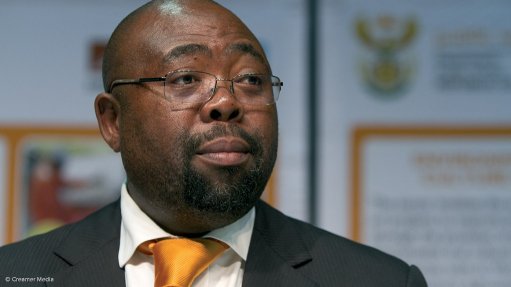
Public Works Minister Thulas Nxesi
Photo by: Duane Daws
The operationalisation of the Property Management Trading Entity (PMTE) will provide opportunities for the property sector – and black practitioners in particular – that will also contribute to economic development, job creation and empowerment, asserted Public Works Minister Thulas Nxesi on Monday.
Speaking at a property industry seminar in Johannesburg, Nxesi explained that the mandate of the PMTE, which operates as a trading entity within the Department of Public Works (DPW), includes the provision of accommodation and the rendering of expert built-environment services to user departments at national government level.
The PMTE is, among other things, also responsible for the planning, acquisition, management and disposal of immovable assets under the custody of the DPW.
Nxesi stated that there were significant opportunities for private-sector investment in the DPW’s property portfolio through the development of unused government land and buildings, and for the construction of small-to-large government precincts and service-delivery outlets in small towns and rural areas.
“The relationship that government and the private sector build together needs to be based on mutual respect and benefit,” said the Minister.
He explained that, while the PMTE would provide opportunities and inject resources, the property fraternity would provide skills, resources, high-quality service and value for money and, together, the entities would create value out of the State’s “long-dormant” property portfolio.
Nxesi further emphasised that, to align itself with the recently announced National Budget, the public service had to contain costs, cut waste and stamp out corruption.
Nxesi said that all public entities, including the PMTE, needed to “justify their existence” by clarifying their mandate and broadly creating or adding value to the country.
“We need to develop more creative and mutually beneficial partnerships with the private sector and labour, where we can work together to mobilise skills and resources to drive economic development and job creation,” said the Minister.
He further pointed out that, over the past five years, the DPW had emphasised the need to improve the quality and efficiency of its service offering.
“We have put in place strong financial controls and systems, established a dedicated Governance, Risk and Compliance branch to investigate cases and comprehensively manage this aspect of our work, and the DPW has charged, prosecuted and dismissed wrongdoers, some at a very senior level,” said Nxesi.
He also noted that the department had established a project called Operation Bring Back aimed at reclaiming State properties that were being unlawfully occupied.
IMPROVED FINANCIAL MANAGEMENT
Meanwhile, the DPW had strengthened its financial management to improve audit outcomes, which resulted in the department moving from disclaimers to an unqualified audit, while the PMTE moved from disclaimers to a greatly improved – but still qualified – audit.
However, Nxesi said the department was confident that the PMTE would this year achieve an unqualified audit.
“We have also set ourselves the task of compiling a comprehensive and reliable immovable asset register (IAR). I am ashamed to say that four years ago we only had a vague idea of what we owned, where it was, the condition and value of the assets.”
He noted, however, that the DPW physically verified all State assets that fall under its authority and had also assisted the provinces with their IARs. He added that, by the end of the current financial year, the department would have assigned values to all the assets, which comprised a portfolio of about 100 000 buildings on 35 000 land parcels.
The Minister described this work on the IAR as a “game changer”, as the DPW now knew what it owned, where it was located and the condition and value of these assets. Therefore, for the first time in many years, the value of government’s immovable assets could be properly reflected on the State’s balance sheet.
“Down the line, this must be positive for the country’s credit ratings,” added Nxesi.
Moreover, the existence of a reliable IAR also provided a solid foundation upon which to build and operationalise the PMTE to manage the State’s property portfolio, he said.
LEASE PORTFOLIO
PMTE head Paul Serote stated during the seminar that the DPW spent R4-billion a year on the leasing of property for government entities throughout the country.
He noted that, last year, the DPW had an independent auditing firm conduct an analysis of its lease portfolio and how it was performing against market values. The research found that 56% of the department’s lease agreements were entered into at above fair market value.
“On average, the DPW is paying 45% above fair market value on its property rentals,” stated Serote.
He said that most of these rental agreements were expiring soon and the department would seek to renegotiate the prices on all its lease agreements to reduce its rental costs.
NKANDLA
Nxesi was asked whether he had any regrets regarding his strident defence of the R246-million upgrade undertaken at President Jacob Zuma’s private residence in Nkandla, KwaZulu-Natal, as the President had admitted to the Constitutional Court on February 2, that Public Protector Thuli Madonsela’s findings with regards to the renovations were, in fact, binding.
He said that the matter was still before the Constitutional Court and judgment had been reserved.
“Our view is, therefore, that the legal process must be exhausted before comment can be made,” Nxesi concluded.